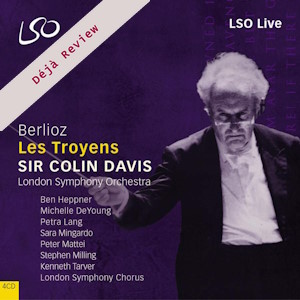
Déjà Review: this review was first published in August 2001 and the recording is still available.
Hector Berlioz (1803-1869)
Les Troyens (1856-8)
Ben Heppner (tenor) – Enée
Michelle DeYoung (mezzo-soprano) – Dido
Petra Lang (mezzo-soprano) – Cassandre
Sara Mingardo (alto) – Anna
Peter Mattei (baritone) – Chorèbe
Stephen Milling (bass) – Narbal
Kenneth Tarver (tenor) – Lopas
London Symphony Chorus & Orchestra/Sir Colin Davis
rec. live, 3, 7, 8 & 9 December 2000, Barbican Centre, London
LSO Live LSO0010 [4 CDs: 240]
This recording, from live performances at the Barbican last December, is the finest opera CD I have heard this year. The sheer electricity generated by Davis’s lithe and fearless conducting of this extraordinary score – even given the fact these are live recordings – is of a magnitude I have rarely encountered elsewhere (indeed, only Carlos Kleiber and Karl Böhm on live opera recordings approach Davis’s thunderbolt excitement). With these discs coming at such an attractive price (less than £20) and with such clear and thrilling sound (even more so given the notorious problems with recording this opera) this set becomes an essential purchase.
Only Wagner it seems got it right about Berlioz. When he said he was ‘devilishly smart’ he just about summed up what made Berlioz so thrilling a composer, particularly in this opera. Hear Les Troyens, with its lavish ballets, the underlying tension of the scoring, the despair and exhilaration of the mood and you have a cornucopia of human expression and fragility within its four hours. Its epic span mirrors the story it tells – yet few operas seem so atmospheric. With its tempestuous storm during the Royal Hunt interlude and the sheer lyricism of the love duet between Enée and Dido Les Troyens can seem both spectacular and intimate. Its scope is simply breathtaking and even more so when one considers how miniaturist the attention to the scoring is.
There are problems, however. Les Troyens is so massive in scale that it takes a master conductor to hold everything together. Listen to even parts of this recording (the transition between the Cavatina and the March in Act I, for example) and you feel that the stitching holding together the woven cloth is not quite as meticulously sewn as it might be. Moreover, the action of the opera can appear very episodic (there are many drastic changes of scenes). The advantage of this live recording, however, is that it is a concert performance and this seems to interfere less with the diffuse action of the libretto than in a fully staged performance.
Davis has lived with this opera for many years (indeed gave the first performance of the complete two-part version in 1969 – more than a hundred years after its completion). The passion and theatricality which colours his Covent Garden recording is in evidence here – although, because this is live, there is a greater tension and latent energy to the conducting. The Trojan March is profoundly exciting – the LSO brazen and blazing. Dido’s Lament, however, has greater beauty than in his studio recording – the LSO playing with fabulous poise and expressivity of tone.
Holding this together is his cast. Ben Heppner, for whom this is his first outing as Enée, is incapable of giving us a single ugly sound and finds the high tessitura of the part comfortably within his scope. His French diction is certainly clearer (and cleaner) than Jon Vickers’ on Davis’ first recording and he sounds much less powerful in tone (in a word, more ‘lyrical’) than Vickers. Vickers had already sung the role on stage so perhaps brings greater involvement to the part but Heppner is not really that less involving, particularly in the Duet and his Aria where the vulnerability to his tone seems closer to the ideal than Vickers’ sheer voluminous power. Michelle DeYoung, imposingly tall in real life, was due to sing the role of Cassandre – but here makes a formidable Dido. Her lament is moving, her characterisation reflective and tense. Petra Lang is a noble Cassandre – perhaps too Germanic in her phrasing – but what clarity of enunciation! Both the LSO Chorus and the LSO are on world beating form.
There are now just three complete recordings of Les Troyens (two by Davis and one by Charles Dutoit) in the catalogue [Beecham’s 1947 recording is heavily cut, as was the norm at the time]. This recording, made in excellent sound and with a conductor at the height of his powers and with even more insights into Berlioz’ epic opera, is marginally preferable to his 1969 recording. Many will indeed prefer Heppner’s lyrical Enée to Vickers’ powerhouse assumption of the role. Josephine Veasey (in Davis I) is a formidable Dido singing with beauty of tone and with enormous vocal strength an overall better recommendation than DeYoung. Dutoit’s all French version is beautifully sung but lacks momentum. What makes Davis II so indispensable is the astonishing playing of the LSO – virile and abrasive one moment, impassioned and lyrical the next. They are simply triumphant.
An outstanding bargain, this is an unmissable set.
Marc Bridle
Help us financially by purchasing from



















